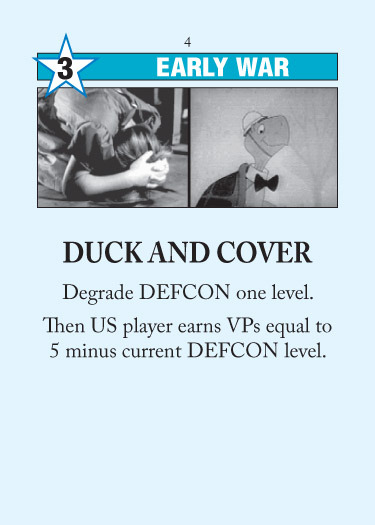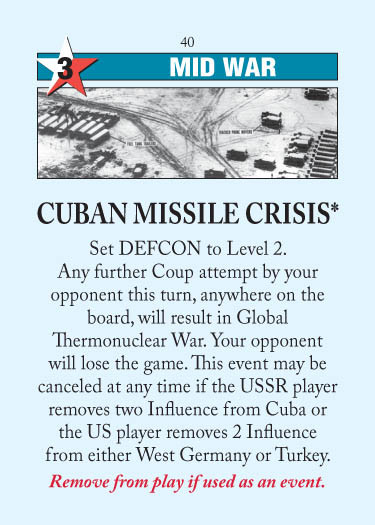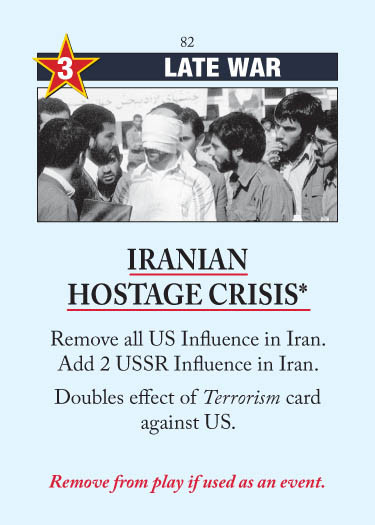Table of Contents
Early War
Duck and Cover

Duck and Cover
1950
The US Congress passed into law the Federal Civil Defense Act, in reaction to the first Soviet tests of nuclear weapons in 1949. Duck and Cover is perhaps the most memorable of a variety of civil defense efforts to raise awareness of nuclear attack. Ironically, such films may have assisted in increasing the possibility of nuclear war by making the possibility of such a conflict “thinkable” by the general public.
Time: Early War
Side: US
Ops: 3
Removed after event: No
As USSR
One of two excellent Early War US events for the USSR, the other being Five Year Plan. As the USSR, you will frequently find yourself in a position where you want to simultaneously place influence but also drop DEFCON down to 2 to prevent an American battleground coup. For instance, you can headline De Gaulle Leads France, and then follow it up with Duck and Cover to take France while simultaneously dropping DEFCON down to 2. If you had instead used some other 3Ops card, the US would at least be able to respond by couping one of your battlegrounds.
Alternatively, it is sometimes more important for you to coup a non-battleground than a battleground, but you still don’t want to give the US a chance at one of your battlegrounds. For instance, a common Turn 3 AR6 play by the US is 1 influence into Colombia, reasoning that on the next turn, you must either coup Colombia (thereby allowing him to coup one of your battlegrounds) or coup a battleground (thereby allowing him access into Venezuela). Respond to this dastardly play by couping Colombia with Duck and Cover, thereby denying him both a coup and access to Venezuela. Similarly, a US player that has put all his Middle East eggs into the Lebanon basket can be couped out easily with Duck & Cover.
Finally, when DEFCON is high (generally only on Turn 1), the USSR can use Duck and Cover to drop DEFCON by two levels in one play. Timed correctly, this can effectively shut the US out of an opening coup altogether.
It goes without saying, though, that Duck and Cover is a serious liability for the USSR if DEFCON is already at 2. It is unplayable and one of the DEFCON suicide cards. Luckily, it is easy to play on the Space Race.
As US
Generally played for operations, though later on the DEFCON drop and 3VPs makes for a strong headline by denying the USSR its coup and earning a sizable chunk of VPs to boot. It is slightly risky to headline in the Mid War, because the USSR can headline We Will Bury You (or, more rarely, Soviets Shoot Down KAL-007 in the Late War), dropping DEFCON to 2 and thus causing you to lose by thermonuclear war.
Mid War
Cuban Missile Crisis

Cuban Missile Crisis
1962
The mere mention of this event elicits fears of the nuclear holocaust that almost was. For 14 days in October 1962, the two superpowers seemed destined to clash directly about the Soviet emplacement of Medium Range Ballistic Missiles (MRBMs) and Intermediate Range Ballistic Missiles (IRBMs) in Cuba. To prevent the installation of additional offensive weapons in Cuba, John F. Kennedy declared a naval quarantine around Cuba. Tensions reached a near breaking point when a U-2 flight was shot down over Cuba, and Khrushchev demanded US missiles be removed from Turkey in exchange for Soviet missiles being removal from Cuba. Ultimately, Khrushchev was compelled to settle for a US pledge not to invade Cuba, and a private agreement to resolve NATO’s missile bases in Turkey.
Time: Mid War
Side: Neutral
Ops: 3
Removed after event: Yes
An ostensibly neutral event that in practice is of far more benefit to the US than the USSR. The event accomplishes several things:
- It lowers DEFCON to 2, so as a headline it is useful to deny the USSR a battleground coup;
- It prevents the opponent from further coups without removing influence from Turkey/West Germany or Cuba.
Now, as US, it is not usually a big deal to remove two from Turkey or West Germany: you’ll almost always have at least two influence in one of those two countries, and removing influence is not a big deal for either of them.
As USSR, however, this event is very problematic if Fidel hasn’t been triggered. If you don’t have influence in Cuba, then you can’t remove it, and so you are essentially locked out of coups for the rest of the turn. This has a number of effects:
- The US is able to play Lone Gunman, which is no longer a DEFCON suicide card;
- The US can play Che without repercussion;
- The US can raise DEFCON (via SALT Negotiations or How I Learned to Stop Worrying) and then coup away freely;
- The USSR is unable to play DEFCON-raising cards (in particular the USSR is now unable to trigger SALT Negotiations or ABM Treaty) without allowing the US several easy coups.
- The US will certainly earn at least 2 Mil Ops VPs, and possibly more if they can raise DEFCON;
- The US can spread freely through non-battlegrounds without fear of being couped.
Of course, the USSR can reap some of these benefits as well (it is nice not to have to worry about Nuclear Subs!), but it is rare for the US to have no influence in either West Germany or Turkey.
Even if the USSR does control Cuba, a Cuban Missile Crisis headline is still pretty annoying, because losing 2 influence in Cuba makes it quite vulnerable.
Finally, Cuban Missile Crisis is a decent headline if you anticipate that your opponent’s headline will lower DEFCON and be subsequent to yours. For example, as US, if the USSR headlines Olympic Games (or Missile Envy, and you hold We Will Bury You), then a Cuban Missile Crisis headline will win you the game.
A couple of rules pointers:
- The influence removal is not an Action and can be done at any time. (It is unclear whether you can actually do this in the middle of your opponent’s Action, i.e., after he announces an intent to coup or realign Cuba, but this is probably an area better suited for sportsmanship than explicit timing rules.)
- The Cuban Missile Crisis win condition takes precedence over a DEFCON-lowering coup, so Lone Gunman is no longer a DEFCON suicide card if the USSR is under its effect and cannot cancel it. (Presumably Lee Harvey Oswald is unable to assassinate Kennedy until he has successfully resolved the Crisis.)
- The text of Nuclear Subs (which confusingly reads “Does not affect Cuban Missile Crisis”) simply means that a US player with Nuclear Subs is not immune from the effects of the Cuban Missile Crisis.
- Cuban Missile Crisis applies to all coups, including “free” coups (through Junta or Tear Down This Wall).
Late War
Iranian Hostage Crisis

Iranian Hostage Crisis
1979 – 1981
A violent reaction to traditional US support for the repressive regime of the Shah of Iran, Mohammed Reza Pahlavi, 65 Americans were held for 444 days after Islamic revolutionaries stormed the US embassy. The newly installed leader of the Iran’s theocracy, Ayatollah Khomeini, was rabidly anti-American and had urged his followers to take action against Western influences. President Carter undertook two scrubbed rescue missions, one of which resulted in a humiliating accident for the US military and for the Carter Administration. Carter’s failure to secure the release of the hostages prior to the end of the 1980 campaign season is often credited with his sizable electoral defeat. Ultimately, Iraq’s invasion of Iran in 1980 made Iran more amenable to ending the crisis. Through the use of Algerian intermediaries, negotiations were finally successful. In a final slap to Carter, the hostages were formally relinquished to US custody on January 21, 1981, minutes after Reagan’s inauguration.
Time: Late War
Side: USSR
Ops: 3
Removed after event: Yes
As USSR
Clearly this is a quality event if the US still controls Iran, a rarity in the Late War. The Terrorism effect alone is not worth triggering the event, but is a good bonus on top of flipping Iran to you (which is at least a 2VP swing in final scoring, possibly more).
It’s important to keep in mind because if you are still attacking Middle East battlegrounds in the Late War (or late in the Mid War), it’s probably best to go for Egypt and Iraq as opposed to Libya (Reagan Bombs Libya), Saudi Arabia (AWACS Sales to Saudis), Israel (stability too high), or Iran (Iranian Hostage Crisis).
One of the advantages of controlling Iran is that the US will be more willing to play this event, thus allowing you to trigger a double Terrorism to really cripple a US Late War hand.
As US
It’s almost certainly worth it to send this to space if you control Iran. Even if it doesn’t affect Domination, it definitely is at least 2 VP for Final Scoring, and at least 4 VP if the Middle East gets scored one more time.
Sometimes even when the USSR controls Iran, you might be tempted to space this. A double Terrorism discard is quite painful, and turning Iran from 0/2 to 0/4 essentially gives up any hope of ever taking the country back. But it’s 3 Ops — so if Iran is already overcontrolled, or if you have no interest in it, then I will risk possible subsequent Terrorism.
Late War recap
Here is a brief summary of the Late War cards (including Optional Cards, as always):
| Late War | Neutral | US | USSR | All cards |
|---|---|---|---|---|
| Scoring | ||||
| 1 Ops | ||||
| 2 Ops | 2 | 3 | 5 | 10 |
| 3 Ops | 6 | 4 | 10 | |
| 4 Ops | 1 | 1 | 1 | 3 |
| Total cards | 3 | 10 | 10 | 23 |
| Total Ops | 8 | 28 | 26 | 62 |
| Average | 2.67 | 2.8 | 2.6 | 2.70 |
The cumulative table for all cards:
| Neutral | US | USSR | All cards | |
|---|---|---|---|---|
| Scoring | 7 | 7 | ||
| 1 Ops | 3 | 6 | 5 | 14 |
| 2 Ops | 9 | 16 | 15 | 40 |
| 3 Ops | 4 | 16 | 16 | 36 |
| 4 Ops | 4 | 4 | 4 | 12 |
| Total cards | 27 (20) | 42 | 40 | 109 (102) |
| Total Ops | 49 | 102 | 99 | 250 |
| Average | 1.81 (2.45) | 2.43 | 2.48 | 2.29 (2.45) |
